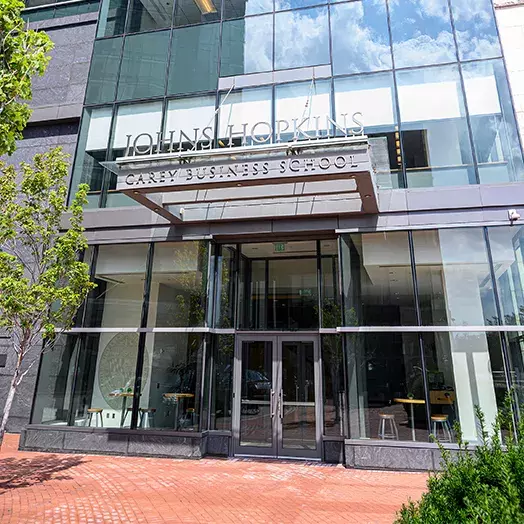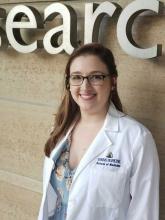
Personal triumph drives first MBA/MD student
Chelsea Moriarty
Chelsea Moriarty’s career path started with a diagnosis – one that cast doubt on any career at all.
“I’m a pediatric cancer survivor. I was diagnosed with leukemia when I was nine years old,” the Johns Hopkins Carey Business School MBA/MD student recounts, almost matter-of-factly. To make this daunting news even worse, her age and type of cancer combined for a poor prognosis. Taking part in an experimental clinical trial saved her life and instilled a drive to help others in a similar situation. “I want to go to medical school, I want to help kids like me, I want to do better,” she remembers thinking at the time. “I grew up in a children’s hospital.”
Graduating from Smith College (the first in her family to earn a college degree) with dual majors in anthropology and biology, Moriarty turned her attention to stem-cell cancer research at Baylor College of Medicine, with her work published in both Genome Biology and Developmental Biology. All along, her passion for medicine, and helping others, continued to grow. “I talked to every doctor who would have coffee with me,” she remembers. “In college, I had wanted my own clinic and was a big advocate for universal access to health care.”
However, she often found frustration during her discourse. “When I talked about it, the economics and finance people would be very dismissive of me. ‘Oh, that doesn’t work and you don’t know enough about economics to understand why,’ she recalls the responses. “So, I’m just going to have to learn it, aren’t I?” she remembers thinking to herself.
Her mentor at Baylor had received an MBA, and shared with Moriarty different ways she applied the degree to her medical practice. That helped further convince Moriarty of the value of a business background. “When I applied to medical school, I knew I wanted a dual degree program.” She would become the first individual to apply to the Johns Hopkins MBA/MD, becoming a pioneer in the process. “Both Carey and the [Johns Hopkins] School of Medicine [were] totally amazing. They bent over backwards to finalize the details I needed [for enrollment].”
Real-World Learning Differentiates the MBA/MD Experience
Moriarty has now completed the MBA portion of her degree, and is finishing her first year of medical school. The diversity in her business classes was a key to her success, she said, with some colleagues having more, and some less, business experience. This helped ease her consternation regarding her own modest background in business. “Everyone came with such unique experiences that I had something to learn from everyone,” she said. “The professors did a really good job of breaking things down so they were easy to understand while challenging us to take our knowledge a little bit further.”
Moriarty would expand her knowledge by working in New Mexico with a Native American tribe, the Jemez, in a deforestation project, as part of the MBA’s “Innovation for Humanity” project. The Jemez had practiced tree-thinning on their ancestral land for generations, as a way to avoid forest fires. They were in critical need of a business plan to present to the National Park Service for funding to continue the work. Moriarty and her classmates developed such a plan, which a subsequent MBA class continues to refine. “It was really good practice in finance, and projections, and in marketing,” she observed, “working in groups and discovering my strengths as a leader and a team player.”
"One of the skills I learned in being a leader, being a team player, is not disregarding someone’s idea, but building off of it.”
Chelsea Moriarty, MBA/MD
The MBA’s “Discovery to Market” class took advantage of Moriarty’s stem cell research experience. “I was working on a project [with School of Medicine researchers] that was able to take skin cells and transform them into fully functioning heart cells. I very quickly filled the role of scientific liaison for my team,” she remembered. “I worked with a group that was really strong in marketing and in financial planning, [but] did not understand how we could take the science and make it into a deliverable product. That was kind of my job. We set out their patent plans, what different things they need to do, and defined for them the market need.” In addition, during her School of Medicine activities, Moriarty has already “been able to find opportunities to leverage my business experience.” One example is the “Stars” program, which involves recognizing employees’ effectiveness and efficiencies in evidence-based medicine, best practices for patients, and financial incentives. Educating employees on the safety and cost-effectiveness of one versus the standard two bags for blood transfusions, for example, is a recent example of smarter business practices helping to promote better medical outcomes.
Moriarty is also involved in “TIME” (Topics in Interdisciplinary Medical Education), which are week-long courses for school staff and students. One course on health care management tackled the challenge of “polypharmacy” (multiple drug prescriptions for elderly patients), that can lead to drug interactions and resultant complications. Moriarty led the brainstorming of ideas on how to identify these patients, then get them off of drugs they no longer need. The class was composed of medical school students, with no formal business background. Moriarty was able to curb their ideas, refining them to get school administration support.
“How can we help patients in a way that’s reasonable and sustaining, especially in light of limited resources?” she remembers approaching the problem. “One of the skills I learned in being a leader, being a team player, is not disregarding someone’s idea, but building off of it.”
In the midst of her studies, Moriarty still finds time to advocate for the Leukemia and Lymphoma Society. She spoke at a recent fundraising event in her hometown of Houston that raised nearly $20,000 for continuing research and outreach programs.
As far as the future, her goals are predictably ambitious while true to her vow as a young patient. “At the moment, I’m leaning toward pediatrics, and possibly something in surgery. A very big long-term goal, I want to be a CEO of a hospital.”
Survivor. Pioneer. Advocate. Even with much already accomplished, in many ways it seems Chelsea Moriarty’s achievements have just begun.
